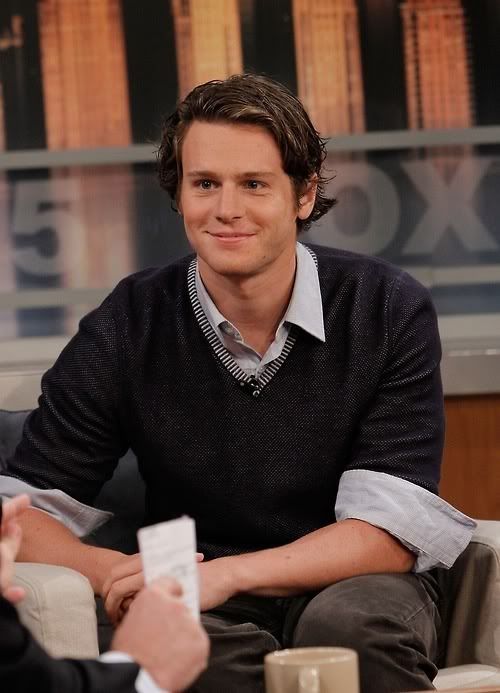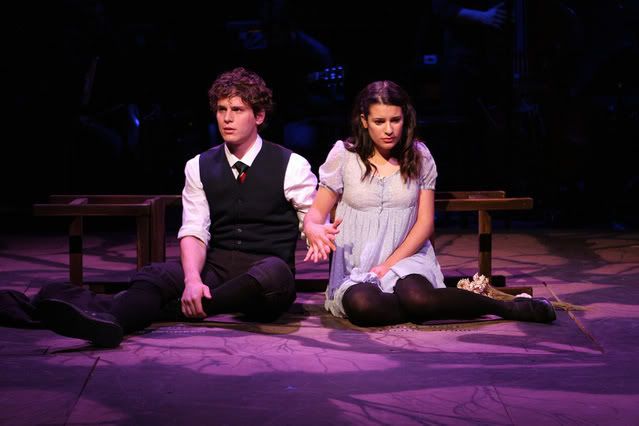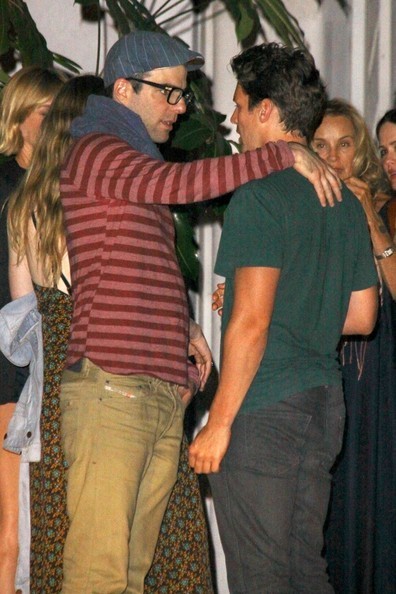via Glooce
The Tony nominee says he's grateful for the experience he's gaining alongside Alfred Molina in the play 'Red' and Kelsey Grammer in the TV series 'Boss'.

Jonathan Groff, 27, who earned a Tony nomination for "Spring Awakening," squares off opposite Alfred Molina in the Mark Taper Forum's production of "Red," about the Abstract Expressionist painter Mark Rothko. Groff also joins the cast of Starz's original series, "Boss," as the assistant to Chicago Mayor Tom Kane (Kelsey Grammer), which has just returned for its second season.
It's interesting that you play an assistant-apprentice in both "Boss" and "Red," but the characters are pretty different. Can you talk about your roles?
I feel that the best way to learn is to work with people who are better than you. On "Boss," I got to play the assistant to Kelsey Grammer, who is an incredible actor and doing something in that show that I think nobody has ever seen him do, and he's just killing it. And then to play the assistant to Alfred Molina [as Rothko]. He's just a total beast onstage, and getting to see him play Rothko, which I think is one of those stage performances that people years from now will say, "I got to see Alfred Molina play Mark Rothko in that production of 'Red,'" and it goes down in theater as one of those historical performances. The fact that I got to play the assistant to both of those actors playing both of these characters was a huge lesson and growing experience for me, and both happened to be generous, sweet men.
So what were the lessons?
It's learning by osmosis, by acting with them and soaking it in and seeing how they work. Certainly in my experience with Fred [Molina], I get to do the same play with him every day in a two-character, so we spend 90 minutes onstage together going back and forth every night, which is different from being with Kelsey, being on set doing the scene once and then never again.Kelsey's process is fascinating: Kelsey turns that character on and off in the blink of an eye. It's insane. And the way he knows how to work the camera, he would coach me even on camera angles and where to look and how to stand. It's watching a master at work and taking mental notes. Then with Fred, watching him night after night re-create these incredible moments and keep it fresh every night is a lesson. It's the best way to learn. I never went to college for acting. I moved to New York pretty much right after high school, so all of my training has been on the job.

It's interesting that you play apprentices and, in real life, there's that element to your work. In "Boss," your character is learning to out power-grab the power-grabber, but in "Red," your character is told to "banish the father ... respect him but kill him." In real life, since your generation will be paying a big chunk of the tab for boomers' excesses, do you have a sense of how your peers view the world they're inheriting? Is it something they want to emulate or smash?
Certainly every person is different. Our generation comes with this world of social media and self-empowerment in feeling the need to share everything on the Internet at all times. Playing the character, what resonates with me is hearing Fred talk about the importance of having reverence for the past and knowing what's come before you in order to move ahead; that's really hitting me in a big way. And I think it's something my generation needs to hear a little bit more of, which is to say I think we all feel really empowered to share by Facebook and Twitter, but oftentimes the listening is going out the door. Sometimes there's a little more output and a little less input.
You weren't familiar with modern art before "Red." Has the play sparked your interest in it?
It really has. I was doing "Boss" [in Chicago] right before I came here to do the play, and they just happened to be doing a Roy Lichtenstein retrospective at the Chicago Art Institute, which I got to check out.

Whom you mention in the play.
Yes, and who's the background of my phone right now and is the poster in my dressing room. I'm inspired by that exhibit. Then during a day off from rehearsal, I flew to Houston for the day and went to see the Rothko Chapel, which is really fascinating. I was reading a lot about Rothko and Jackson Pollock and their art and opinions of their art, and seeing the art was so much more affecting than simply reading about them. We took a little field trip from rehearsal to go to MOCA. I went to "The Painting Factory" exhibit between shows with Fred last weekend. Fred's voice is always in my head; whenever I look at a painting, I hear, "Lean into it. Engage with it. Let it affect you." So it's more fun now to look at art because I feel so ready to be open to it. I'm so blessed and lucky that I got to do this play, because it busted open a whole other side of me that wasn't there before.
You grew up in Amish country in Pennsylvania, and your father is a Mennonite horse trainer and driver. He's not a cabbie; he races them, yes?
Yes, it's harness racing.
Does your father eschew 20th and 21st century technology?
I was raised Methodist. My mom is Methodist, my dad was raised Mennonite. Amish are the ones with the horse and buggy, and Mennonites are very conservative — like my grandmother wore a covering over her head and simple handmade dresses — but they definitely drive cars and tractors. A lot of them are farmers. It's simple living. Interestingly, the Mennonites in my hometown are very close with the Amish. My grandmother had Amish people work in her garden and clean her house, and the Amish are allowed to ride in cars but not drive them. So I would drive the Amish from her house to their farms.
Professionally, you were involved in community theater in Pennsylvania. Was there much between that and being cast in the lead role in "Spring Awakening"?
When I graduated from high school, I went on tour for a year with "The Sound of Music," and then went from that to living in New York; after a year and a half in New York, I got "Spring Awakening." So there was a year and a half of auditioning and waiting tables and doing summer stock, and then I did an understudy role in a Broadway flop musical. And right after that, I got "Spring Awakening."

Let's talk about that Newsweek critic who, when you were guest-starring in "Glee" two years ago, said you were unconvincing as Lea Michele's character's straight love interest. He said, you seemed "more like your average theater queen." You're laughing now, but how did you feel about that at the time?
To be honest, I feel the same way now as I did then. Here's the deal — I go to my auditions and plug away and try and do my best. People are going to say whatever they're going to say about your performance, and at the end of the day, you can't let that stuff affect you. Everyone is entitled to his opinion, and it started a lot of good conversations probably. All I can do is laugh and keep moving forward. Sexuality is such an interesting thing. Unless you're playing a very effeminate person, a stereotypical queen, it's hard to say what it means to play gay.
You casually came out at a gay rights event in 2009, and you're featured in the current issue of Out magazine. And you and Zachary Quinto are public about being a couple. So what do you think about gay actors who stay in the closet?
Ultimately everyone has their own journey. The more people that come out the better, because it makes it easier for the next generation of people coming out, and it makes people more comfortable with it, the more people they know. But at the end of the day, if people don't want to come out, it's their personal choice. I feel really blessed to be living in 2012. Certainly there's a long way to go, but I feel really positive about how, even in the last 10 years, being gay has become more accepted.

source


No comments:
Post a Comment